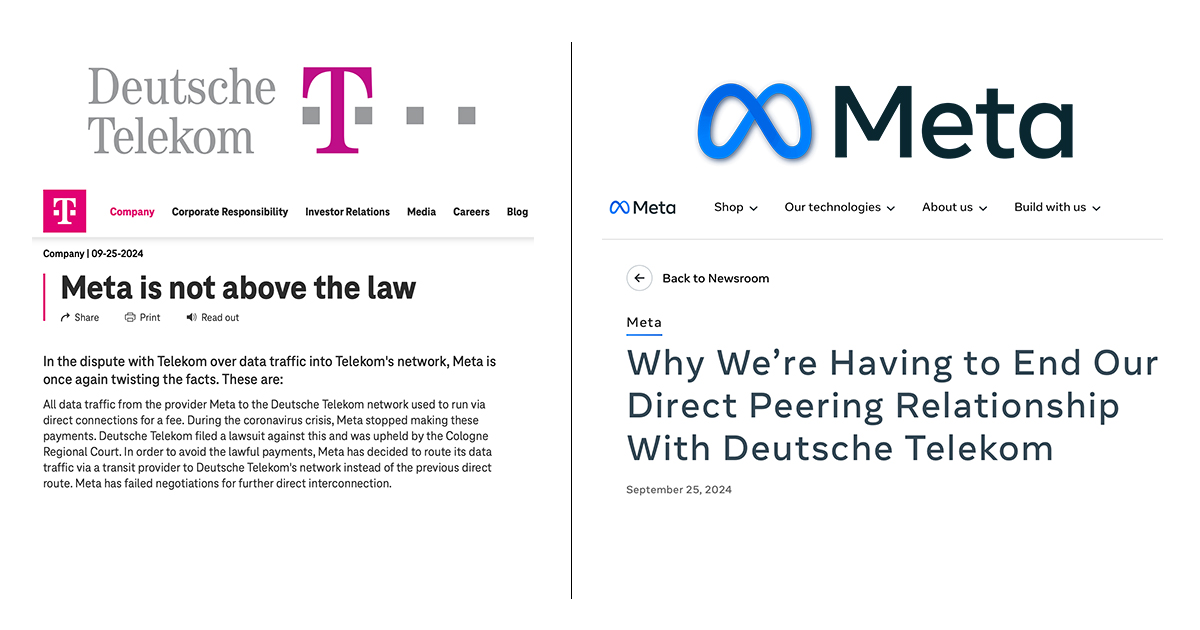What Many Are Getting Wrong in the Meta and Deutsche Telekom Peering Dispute

Meta and Deutsche Telekom are having a peering dispute, with the companies ending their interconnect deal. While the two sides are blaming each other, Meta is under no legal obligation to pay Deutsche Telekom for access to their network. Deutsche Telekom is under no obligation to give Meta peering for free. As Deutsche Telekom correctly points out, “Meta alone decides how Meta traffic is routed to Deutsche Telekom’s network.” Meta has switched to using transit providers instead of a direct interconnect to connect to Deutsche Telekom’s network.
In its blog post, Meta says, “given the court ruling concerning the unprecedented and unacceptable fees demanded, we are now routing our network traffic through a third-party transit provider.” Meta doesn’t say how Deutsche Telekom’s fees compare to Meta now paying transit providers to connect to Deutsche Telekom’s network. Deutsche Telekom disclosed that Meta used to pay for access to their network but stopped paying in March of 2021. Why did Meta stop paying? Was there a capacity issue? SLA issue? It’s rare for a platform provider to pay for a direct interconnect to a network and then just stop paying. Is Meta comparing Deutsche Telekom’s fees to what they had for free? Any fee seems “unacceptable” compared to what a company got for three years at no cost.
Meta says Deutsche Telekom “is using its market power to put its subscribers in Germany behind a de facto paywall, potentially restricting their access to internet services that do not pay Deutsche Telekom.” This is not accurate. Deutsche Telekom has not restricted or blocked any of Meta’s apps or services, and Meta knows this, which is why they used the word “potentially.” There is no business reason for Deutsche Telekom to restrict any of Meta’s services, as that would only harm Deutsche Telekom’s customers, who would complain to Deutsche Telekom, not Meta.
I see some in the media saying instead of Meta, “continuing to pay extortionary network fees for a direct connection,” which isn’t accurate. Meta hasn’t been paying anything for the past 3+ years. And what are the fees exactly? Who’s to determine what is considered “extortionary.” I also see some suggestions that Instagram, Facebook, and WhatsApp will “slow to a crawl,” which again is inaccurate. As Deutsche Telekom stated, “the rerouting of data traffic in the night from Tuesday to Wednesday went smoothly.” We see no reports of any Meta apps or platforms having QoS issues, and the media needs to stop suggesting that there are user issues when they do not exist.
While this all boils down to a business dispute between two companies, it’s important to point out that a German court ruled in this contractual dispute between Deutsche Telekom and Meta based on the principles of German contract law. Meta may not like the outcome of the ruling, but it’s the court that decided. Meta is free not to pay Deutsche Telekom and instead move to a transit provider model as they have done.
All of this aside, settlement-free peering and paid interconnects are the basics of how the Internet works so well. I disagree entirely with Deutsche Telekom’s statement that “regulations are needed to ensure the settlement of disputes.” Regulators have no idea how any of this works, and any time they do get involved, it is always behind closed doors. It becomes grandstanding by politicians and lobbying organizations paid by both sides, getting in the middle of the debate. Many step forth with studies and papers implying they are neutral when they get paid by lobbying organizations and have conflicts of interest. The public doesn’t get the details of the contracts or costs, and any shared data is always used to skew the argument without the complete data set being shown.
Regulators won’t fix this, nor should they be allowed to. The biggest problem in this whole discussion is the media. Too many suggest blocking, throttling or slowing down of Meta’s services is taking place when it isn’t. Or speculate, with no proof, that Deutsche Telekom won’t put enough capacity in place with Meta’s transit provider, which again, we know isn’t a problem. Analysts and media members need to stop taking sides and report the facts. All the what-ifs, what could, and what might happen are speculations on their part, and you can’t have a rational discussion and solve business problems focused on theory. Stick to the facts.
Deutsche Telekom Post: Meta is not above the law
https://www.telekom.com/en/company/details/meta-is-not-above-the-law-1079704
Meta post: Why We’re Having to End Our Direct Peering Relationship With Deutsche Telekom
https://about.fb.com/news/2024/09/why-were-having-to-end-our-direct-peering-relationship-with-deutsche-telekom/
